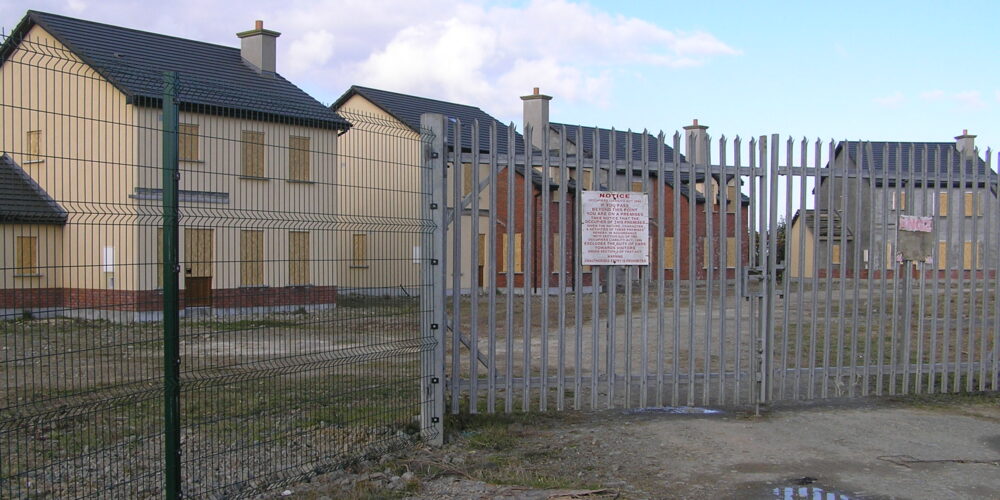The crisis in housing is official Government policy. It is not an unintended consequence. The profit margins of the various corporate property funds that have entered the Irish housing market since 2013 require a crisis, in the supply of both public housing and affordable housing for purchase, leading to a high demand for the rental housing units that are controlled by the funds.
This is precisely what is happening at the moment, and it is fully supported by the three government parties, as well as the Labour Party, despite their various protestations.
However, the Government was forced to act recently when stories surfaced regarding the bulk purchase of entire housing estates by private funds. In the resulting media storm the minister for housing introduced legislation that was hailed as a turning-point by the Government parties, no doubt hoping that the lack of future headlines will ease the political pressure.
The legislation passed by the Dáil in May 2021 imposes 10 per cent stamp duty on bulk purchases of ten or more houses. (This rate does not apply to the bulk purchase of apartments, which remain unaffected.) It also brought in new rules to allow local authorities to state that up to half of all new houses in a development must be sold to households.
The Government’s plan, the way it is structured between who will benefit and who will not, reveals the economic class dynamics underpinning the policy.
It is in the interest of these funds that the housing crisis continues. In its first annual report in 2016, Irish Residential Properties REIT stated that “strengthening fundamentals in the residential rental business” was predicated on two things: the first was extremely weak levels of new residential housing; the second was a cheap supply of apartments from NAMA.
The company told its shareholders that Ireland’s “significant supply and demand imbalance helps support the rental market.” In other words, its business model demands a housing crisis, not its resolution.
The message was broadly the same in its annual report for 2020. The supply of cheap apartments from NAMA had dried up, but its bulk purchase of apartments from the private sector helped to compensate for this change in circumstance.
The company is not just buying up apartments as rental assets: it is also taking them out of the supply chain for households to purchase themselves. In 2019, investment funds bought up 95 per cent of all apartments completed that year. Of the 3,644 that were built, only 182 were for sale on the open market.
The property funds are not just making money from private renters. The German investor Realis recently bought 90 apartments in Dundrum for €55 million. It is now leasing those apartments to Dún Laoghaire-Rathdown County Council for social housing at prices up to €3,000 a month.
The fact that the property fund business model for apartments remains entirely unaffected by the new legislation is a clear sign that the Government is involved in window-dressing.
The stamp duty of 10 per cent is another ruse. The bulk purchase of houses (as opposed to apartments) up to now has been only a small element of the overall business plan of property funds. This is growing, of course, with the new stamp duty rate simply an “added cost” rather than something that will lead to structural change in the housing market. The 10 per cent duty, where bulk purchases occur, will be added on to the total rent charged.
It is still in the interests of the property funds to bulk-purchase houses, as by doing so they will affect total supply for residential buyers and become, in a not insignificant way, “price-setters” when it comes to rents.
Finally, the allocation of up to half of all new houses for individual purchase leaves a lot of room for abuse. The legislation allows for zero allocation as well. It will be up to each local authority to set the rate—and, going by past performance, it is unlikely that households will be the winners here.
The greatest threat to the property funds would be an increase in the amount of public housing built by the state that is then offered to households for rent or even long-term purchase at differential rates—that is, monthly rents or mortgage repayments set at a proportion of net income, usually 15 per cent.
Failing this, a universal social charge type of tax on the income of the property funds (not profit or purchases) would virtually kill off their presence in Ireland. The funds are set up as tax-avoidance structures for their shareholders. A tax that affects the income stream is one that cannot be avoided and if set at a sufficiently high rate would dampen or dispense altogether with the attractiveness of the funds in the first place.
Finally, the Government could introduce a flat ban on the bulk purchase of housing units.
It is incredible that in the midst of a housing crisis anyone—either as an individual or as a shareholder in a property fund—can purchase more than one house at a time.
The fact that the recent legislation will continue to facilitate property funds and their socially destructive business model of killing supply to increase rents is evidence enough that no solutions will come from the Dáil at this time.
If ever there was a time for protest and community organisation, this is it.






